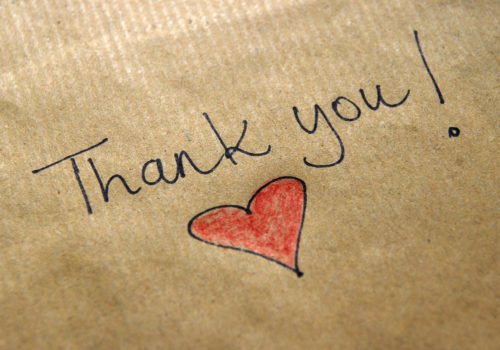 There are two words that are never going out of style in the English language.
There are two words that are never going out of style in the English language.
THANK YOU.
But we aren’t a culture that is really very good at thank you's are we?
How often are feelings hurt because someone forgot to say it,
One of my favorite gospel stories on the topic of saying "Thank you" comes from Luke 17:11-19.
And this is the scene: Jesus is on the way to Jerusalem. While passing the border between Samaria and Galilee, he and his disciples hit a rest stop known as a local village. And in this village, Jesus and his disciples were greeted by a group of ten men. They were all lepers-- a contagious skin disease that caused massive deformity.
Though pale by comparison to many other instances, a couple of years ago we had experience in our household that gave me greater sympathy for who have dealt with skin deforming or long-term contagious diseases.
Kevin contracted the shingles.
During the two weeks that followed and Kevin while was contagious our whole household routine was altered.
I have to confess I went a little crazy trying to make sure I didn’t get it too.
I made these rules: we would not sit on the same pieces of furniture. We would wash all of the sheets and towels immediately in hot water after Kevin finished with them. We would wash our hands frequently and we would clean the bathroom a lot.
A week or so in to the ordeal, I think what was worse was not just the physical pain Kevin had but the social isolation. He told me how much he missed human contact. He missed being able to come home and sit wherever he wanted on the couch. . . .
In a similar way, these lepers felt isolated.
Their family members kept their distance. Even worse there was little hope that they’d ever get “well” because known medicine at the time had few solutions.
Only solution: shout “Unclean! Unclean!”
Yet, on this occasion scripture tells us, they risked everything and approached Jesus.
And, Jesus’ response was, “Go and show yourselves to the priests.”
We might think this that this is a strange request—why did they need to go to the priests? Could have Jesus just healed them on the spot?
Much like a person today wrongly accused and placed on the sex-offender registry, to be a leper was a sentence of societal isolation until the religious powers that be changed the degree about the person.
A leper needed to be first verified by the priests BEFORE the person could re-enter the world and be treated like everyone else.
So, in Jesus telling them to go to the priest, he was saying to them, in your faith in me, go get what you need to have your cure from leprosy. Go to the priest and you will be clean.
What happened next? Verse 14 tells us that without hesitation all 10 go as Jesus tells them, and “as they went, they were made clean.” It was a miracle! They were given the cure that each of them had been dreaming about for years! What a day! What an amazing day it was.
Yet this is what I want you to pay attention to. . . .
We read no record that 9 of 10 lepers ever saw or talked to Jesus again. 9 of them said nothing more to Jesus. There would be no thank you from their lips.
It would be easy at this point to begin to speak negatively of them. Why did they NOT say thank you? Wouldn’t have that been the polite thing to do? Yet, we never hear harsh criticism by Jesus of them. The lepers were cured after all and life would be forever different! They needed to celebrate.
 What about that one, though? The one who we read about in verse 15 who “saw that he was healed, turned back, praising God in a loud voice.” What was different about his experience? What did he come back and say thank you?
What about that one, though? The one who we read about in verse 15 who “saw that he was healed, turned back, praising God in a loud voice.” What was different about his experience? What did he come back and say thank you?
I think distinction comes as we follow the word “see” throughout the passage.
Hang with me for just one minute.
First, there is Jesus, who “saw” the lepers for the human beings that they were as they cried, “Unclean! Unclean!” It was where the miracle began.
Then, there was the one leper who after being cured “saw” himself as a new person and turned back to go to see Jesus once again.
Jesus and this one leper paid attention.
And this is the powerful part of the story in this one man’s coming back to say thank you, he was more than cured from his disease he was healed.
For there’s a difference between being cured of something and being healed, isn't there?
Being cured of a disease is all about having the physical symptoms going away. But healing is about something much deeper—healing is about emotional peace and spiritual peace and being able to walk in this world differently.
And this one who came back to say thank you got both a cure and healing too.
How? Jesus tells him that “his faith had made him well.” I want to stick with the word, “well” for just a minute because I believe it has a lot to teach us about what transpired.
The phrase, “made you well” comes from the Greek word sozo which is commonly translated “to save.” A soter is a “savior, deliverer.” Thus, in being “made well” the Samaritan finds salvation, but not salvation in the way that many of us might think of in terms of the typical “get saved” terminology. No, rather, by coming back in praise of God, the former leper acknowledged his dependence on something greater than himself.
This was the HEALING-
The years of anger, the years of bitterness, “Why me, God?” the years of emotional and spiritual pain were no longer chains that bound him up on the inside, as much as his disease isolated him from others on the outside.
He finds rest for his soul.
Few of us crave this kind of healing, do we? We often pray for CURES when we hear someone has cancer or is struggling with addiction or depression.
We say things like: “Dear Lord, please make my mom better.”
“Dear God, please help my son not make so many bad decisions.”
“Dear Lord, get me OUT of the hospital."
Sometimes we feel our prayers are answered. Sometimes we don’t. Sometimes we want to lash out at God and say, “Why is he still sick? This is all YOUR fault.”
But, I want to suggest in moments like this, we might in fact be focusing on the wrong things . . .
What if we, left the possibility of the “cures” to the mystery of life, and instead, remembered that all of life is gift?
This is what I most know: only leper who was healed was the one engaged in gratitude.
I have no idea, I know, my friends what is burdening you today, but what I do know is that gratitude is an invitation to the healing God wants to give us all. All of us.
Be the one who says thank you!
 Like I wrote about earlier in the week, Thanksgiving has always been one of my favorite holidays.
Like I wrote about earlier in the week, Thanksgiving has always been one of my favorite holidays.
I love the opportunity to be gathered around a table of people who know and love you well.
I love eating pie without guilt!
For these reasons and many more, I'm glad that Kevin and I got to spend Thanksgiving in one of our favorite places, Nairobi visiting friends. Even though it is rainy season in East Africa, we love being refreshed by the crisp African air. It's good to take time off and just enjoy the beauty of life in nature and to be away from your normal surroundings, learning from another cultural context.
Many thought we should cancel our trip.
And on Thanksgiving day, we traveled to cook a traditional American Thanksgiving dinner at one of our favorite places-- though with a few moderations. We had turkey, cranberry sauce, sweet potatoes and stuffing but we added a green salad, apple cake and cupcakes.
When the meal was finished, our hearts and bellies were full on joy!
We were so happy to spend Thanksgiving around this beautiful table with these beautiful children at this orphanage. I have to think it's a picture of heaven.
We are happy to still remain a part of the Feed the Children family as donors, even as Kevin's work life has taken him elsewhere.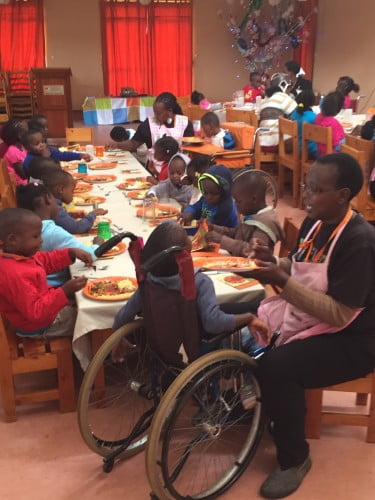
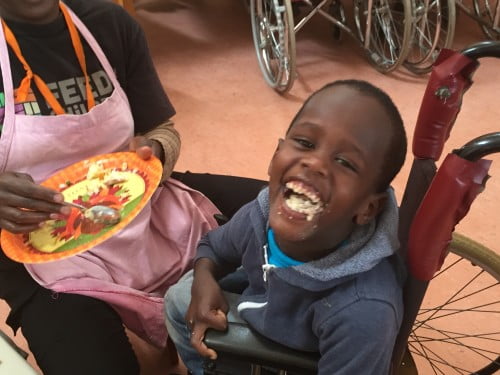
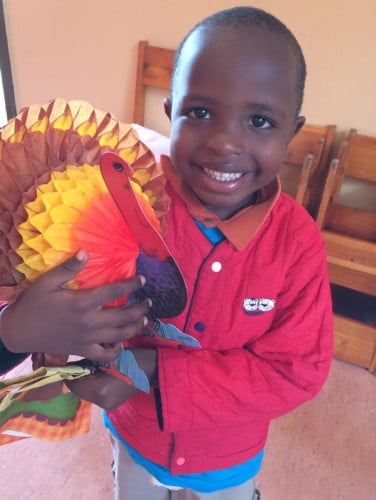 Until next year, happy Thanksgiving to all!
Until next year, happy Thanksgiving to all!
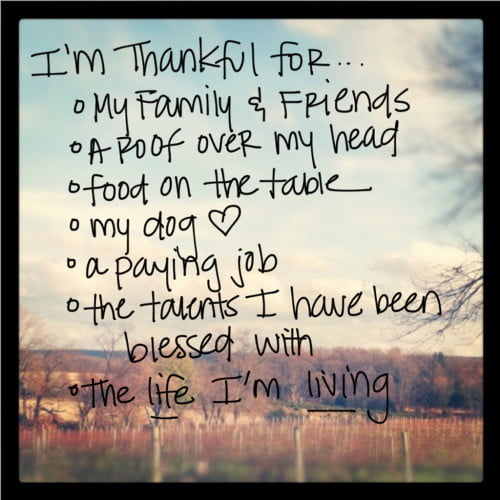 It’s Thanksgiving week in the United States, that time of year when we all start thinking a little more precisely about what it means to be thankful.
It’s Thanksgiving week in the United States, that time of year when we all start thinking a little more precisely about what it means to be thankful.
In my household, Thanksgiving always including making an "I'm thankful for..." list.
It’s a beloved pre-thanksgiving meal activity I’ve participated in since childhood when my grandmother would ask even the youngest of her grandchildren to express gratitude for something by drawing a picture, sharing a song with the family, or my cousin Ellis’ favorite, the yearly reading of the Dear Abby thanksgiving prayer.
I loved, growing up that our family even had a church service (led by the children) before we ate that included songs, skits and readings. There's no wonder I ended up as a pastor. . .
And this year:
We might say we’re thankful for our access to enjoy tasty food.
We might say we’re thankful for the love of our family or friends.
We might say that we’re thankful for our health, especially if we or someone we love has faced a health scare recently.
While I’m all for public declarations of gratitude, I’ve often felt these types of lists are robotic at best.
But what we avoid is the deeper stuff.
For it might feel just a little too vulnerable to say:
I’m thankful for the months of renewal in my marriage after years of thinking I’d made such a terrible choice in a life partner.
I’m thankful the days when my estranged friend picked up the phone to call me. Things aren’t like the used to be, but they’re getting better.
I’m thankful for one of the worst seasons at my job—days when I worked long hours and never thought my boss was never pleased—for the endurance it’s given me to know what I want next in my career.
Or, I'm thankful I finally sought help for my depression, my alcoholism, my anxiety, etc.
For they speak to real life.
Life that we all experience.
Life that is hard. Life that is messy. And, life that can ultimately be beautiful if we just allow time and grace to do it’s healing work.
I'm reading Brene Brown's new book, Rising Strong right now. And she captured me from the first couple of pages with words like this about the gifts of vulnerability.
"I believe that vulnerability-- the willingness to show up and be seen with no guarantee of outcome-- is the only path to more love, belonging and joy. . . When we own our stories, we avoid being trapped as characters in stories someone else is telling."
And I agree with her.
Our fists loosen.
Our arms unfold.
In this position, gratitude is actually transmitted one person to another.
 And in a world in need so much healing, so much love, so much hope that evil hasn't won in a month of so much terror-- don't we need more REAL gratitude?
And in a world in need so much healing, so much love, so much hope that evil hasn't won in a month of so much terror-- don't we need more REAL gratitude?I know that not every thanksgiving table is ready for this type of sharing. Some tables just aren’t safe places for you and I to lay the burdens and joys of our hearts open to, and we should be mindful of this.
But, we all can find somebody this week—somebody we can give testimony to of our REAL gratitude.
Somebody in whom we could say something like, “You know what, this has been one of the most horrible years of my life, but I am so grateful for . . . ."
Or better yet, seek out a person for whom you are grateful for and let them know how much they mean to you!
I know, for one, I’m grateful for you, dear readers of “Preacher on the Plaza.” Your interest in my words encourages me continually. Happiest of thanksgivings to you!
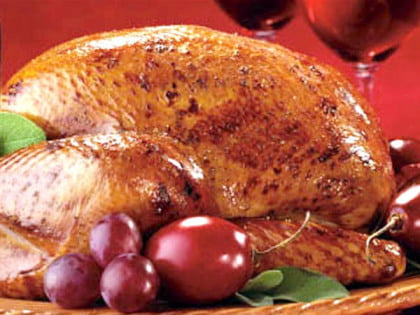 The countdown is on . . . I have to say that thanksgiving is my FAVORITE holiday of them all. Some of my most favorite childhood memories were made during thanksgiving extravaganzas planned with my cousin, Ellis, four years my elder (which of course made him extra cool). Those of you who've spent Thanksgiving with me know that I'm serious about my traditions. Even the year that my friend, Kristina and I spent the day in Italy and even the year that Kevin and I went to Argentina for a wedding, we still did (or tried to do) these things.
The countdown is on . . . I have to say that thanksgiving is my FAVORITE holiday of them all. Some of my most favorite childhood memories were made during thanksgiving extravaganzas planned with my cousin, Ellis, four years my elder (which of course made him extra cool). Those of you who've spent Thanksgiving with me know that I'm serious about my traditions. Even the year that my friend, Kristina and I spent the day in Italy and even the year that Kevin and I went to Argentina for a wedding, we still did (or tried to do) these things.
In our house, nonnegotiable for the holiday include:
1. Singing "We Eat Turkey" (a song I learned in 2nd grade music class). "We eat turkey. We eat turkey. Oh, so good. Oh, so good. Only on Thanksgiving. Only on Thanksgiving. Yum. Yum. Yum." Repeat- and add in your favorite food. (to the tune of Frere Jacques). It can go on forever which is one of my favorite parts of it.
2. Saying around the thanksgiving table what you are thankful for-- more than just "friends or family" I love when people really say what they feel gratitude about. Has life blessed you with something you didn't expect? Has an unexpected relationship surprised you? Where have you found joy?
3. Reading the "Dear Abby" prayer before dinner.
4. Going to a movie on Thanksgiving eve-- just completely chilling out.
5. Thinking about the memories of thanksgiving past-- the times when Ellis and I organized charity basketball games, made up our own fantasy football league, took and gave others Pilgrim tests, organized a family church service and of course choreographed dance videos.
Also, some of my favorite sermons preached have been on the topic of thanksgiving. Such as this one I preached last year called "The One Who Said Thank You." It has always been fun to integrate one of my favorite holidays into my work life, encouraging others that it is good to stop and thank the Lord for all our blessings.
It is the most wonderful time of the year! Happy thanksgiving to you and yours.
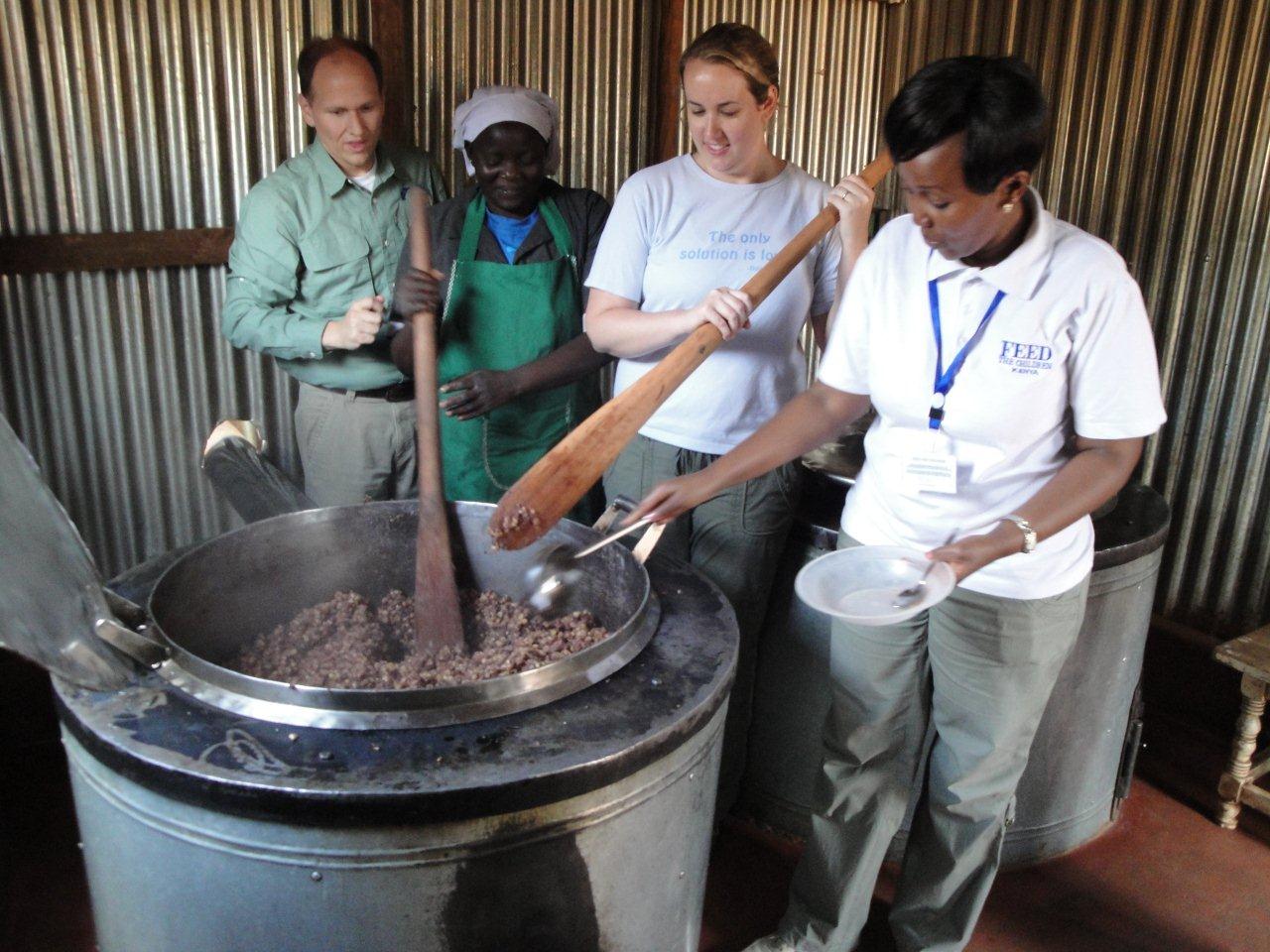 As I’ve been back in the US this week and have been processing the trip Kevin and I shared to Malawi and Kenya last week, one of the questions/ comments I've heard a lot is: “Aren’t you so glad to be back? I’m sure the poverty was heartbreaking over there. You must be so relieved to be at home again so that you can get back to 'normal' life.”
As I’ve been back in the US this week and have been processing the trip Kevin and I shared to Malawi and Kenya last week, one of the questions/ comments I've heard a lot is: “Aren’t you so glad to be back? I’m sure the poverty was heartbreaking over there. You must be so relieved to be at home again so that you can get back to 'normal' life.”
I mean no offence to any of the wonderful people in my life here, but I really do want to say "no". I haven’t been relieved to be at home. In fact, I’m grieving the passing of the experiences of last week. With many tears, Kevin and I were quite sad to leave. The work we participated in-- such as serving lunch to school children in the slums (see picture) was so special. It's the purest and most wonderful parts of this kind of work.
And while yes, there are so many perks to life in the US— water from the sink that is safe to drink, constant source of power to your home without daily interruptions, warmth and water pressure in your daily shower, well-constructed roads and city planning that makes getting from place to place easy, etc, etc—I really want to convey that being in the US is not always the end all existence. We aren't as rich as we might think.
And this is what I know: I feel our journey took us from two rich countries to come home to a poor one.
For the true be told, when we begin to life with less as Kevin and I did last week, we realize we need less. When we converse face to face, those whom we thought we came to serve become our teachers. When we relax and enjoy life, laughter springs up even in the slums.
It’s obvious what you might be thinking. All the world statistics of East Africa tell a story of scarcity of resources. Access to clean and safe drinking water is rationed - if present in some communities at all. Mothers die unnecessarily during childbirth. Fathers die too soon of preventable diseases. If children live to their 5th birthday, families are overwhelmed in amazement. The number of inequalities in this land are unfathomable. Cycles of poverty seem too strong to even imagine being broken (even if all the NGOs and government agencies actually worked together).
But, even with this true, there’s another story at work. And it’s a story not of poverty, but of abundance. As we spent time with the Malawians and the Kenyans, this is the richness I saw:
People share.
Smiles are warm and heartfelt.
Time is unhurried.
Simple pleasures like breaks for tea and coffee are honored.
Food is savored, not devoured.
Leftovers of all kinds are not put to waste.
Help given is received with overflowing gratitude.
Sitting from my position of privilege, it's not that I want to overspiritualize poverty. Rather, I want to say that in the US, I believe it is so easy to become distracted by our blessings. We not only take them for granted, but we become consumed with them to the point of forgetting from where they came. We forget the responsibility that comes from such great gifts. We forget to be people of blessing instead of just people with blessings.
As I continue to stick close to what my spiritual teachers taught me last week, I hope you’ll join me in thanksgiving for the great paradox of the gospel. The last shall be first and the first shall be last. It is more blessed to give than to receive. And, blessed are the hungry, for they will be filled.
Our sermons by request series continued this week with Psalm 150. I wondered what I was going to do with this text when I first read it (as I've never been very good at my attempts to preach on the Psalms), but in the end I was glad for the challenge. And what a FUN service we had. Everytime the word "praise" or "blessed" was spoken in worship, the congregation was asked to play one of the percussion instruments they were given when they came into worship. It was a joyful day of living this passage together! Thanks for reading.
Let's Praise the Lord: Psalm 150
What we say or do last often has much to say about what is most important to us, doesn't it?
Since our congregation hosts the community "Seven Last Words of Jesus" Good Friday service every year with several other local churches, I have found myself in the position of needing to wrap up the service, being one of the last speakers wrapping the afternoon up before the audience starts to growl back at us long-winded preachers. As I've prepared these sermons the past four years, one thing I've noticed about these last words of Jesus is their deep significance to the larger bulk of his teaching-- teaching about loving the Lord our God with all our heart, soul, mind and strength and loving our neighbor as ourselves. Jesus' final words have a lot to say about who he was trying to show us to be all along, in surrender to the will of his Father in his words, "Into your hands I commit my spirit."
And the same is true for our lives, I believe too-- not just in our dying moments but in our every day "last" moments. We usually wait till the end of a conversation, till the end of a night, till the end of a service to get to those moments which speak to the identity of who we ultimately are. For example:
When we are having a conversation with a friend or family member, what is the one phrase that we usually end the conversation with if our relationship with them is strong? We say, "I love you." Three such words powerfully express what the foundation of our connection with the other is based upon.
When we are putting our young children to bed after turning out the lights and making sure they are tucked in, what is the thing we do before we leave the room to show our love? We give them a hug or a kiss. The sheer act of physical touch conveys to our young child-- even if we are not able to communicate in words to one another yet how it s we feel about them.
When we end our worship service together each Sunday before we go share coffee hour together, what is the one thing we always do together? We hold hands, form a circle and sing what? "Make Us One." We sing with great gusto this contemporary chorus as a tangible symbol of the unifying community the church is in our lives.
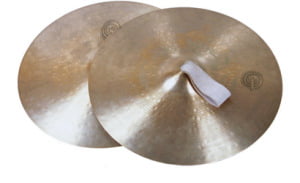 In the same way, when we read our scripture lesson for today, the 150th Psalter-- or the LAST of the hymns in this great hymn book of the Hebrew scriptures, what we find, I believe is a statement about life that this book of prayers has been trying to tell us about all along.
In the same way, when we read our scripture lesson for today, the 150th Psalter-- or the LAST of the hymns in this great hymn book of the Hebrew scriptures, what we find, I believe is a statement about life that this book of prayers has been trying to tell us about all along.
And this is what we are told-- we are told that the highest activity we can offer in our life is that of praise. Specifically in verses 1-5, there are countless ways suggested that we might offer our praise to God.
We may praise God in God's house. We may praise God for the goodness that we see around our lives-- simply lifting up our thanksgiving to God (as we just did in the service a few moments ago) with our words.
We may use our bodies in dance as an expression of praise.
We may gather around us instruments that help us express what words simply lack.
We may beat the tambourine or the cymbals-- in fact loud clashing of cymbals to simply say back to God, "I acknowledge you. I revere you. I want to know you."
In the end, we are told that none of us is without excuse-- not even those of us who can't carry a tune or play the drums or move our body in worship without looking like we are doing the funky chicken. "Let everything that breathes praise the Lord!"
Aimee Simple McPherson, a female pastor in the 1920s and founder of the Four Square Gospel Movement was known to say this, " "Let everything that has breath praise the Lord." Why, according to the Psalmist, the only excuse you have for not praising the Lord is being out of breath!"
So take a minute and take a deep breath to remind yourself if you are still breathing . . . and as you breathe out say with me, "Praise the Lord."
If you look closely with me at this Psalm, what you will notice is the ongoing use of a repetitive phrase at each stanza of this poem: "Praise the Lord!" In 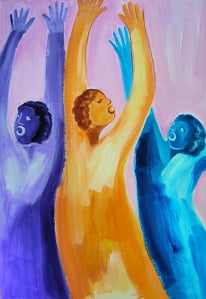 fact the word "praise" occurs 13 times in six verses which makes it important to pay attention to. . . Or better translated from Hebrew, "Hallelujah!"
fact the word "praise" occurs 13 times in six verses which makes it important to pay attention to. . . Or better translated from Hebrew, "Hallelujah!"
If you've been around church for any given period of time, hallelujah is a word that you probably know. But, you might not actually know what it means. One commentator helps us out here: "To be precise, hallelu is the plural imperative of the verb hallel ("to praise"). And jah (or yah) is shorthand for the personal name of God: Yahweh. So, to put it in a Southern idiom, hallelujah means "Y'all praise Yahweh!" It is a summons not primarily to the individual reader or hearer, but to a whole community."
Praising Yahweh a big and bold and countercultural task. We are a lot better, aren't we, at telling those around us what wrong with our lives than what is right? Extending the virtue of praise over our entire lives is not exactly our first instinct. And because of this, praise is something, I believe that we cannot do alone.
How many of you have ever had an experience of coming to church on Sunday morning and by time you sit down, feeling like "What am I doing here? I'm really not in a mood to be spiritual this morning? I'm really not in a mood to worship God this morning? I'm really not a place to get anything out of the service?" (I promise I won't bite if you raise your hands in affirmation).
We've all be there, your pastor included. There are days when I wake up on Sunday morning and as excited as I was on Friday afternoon when I finished writing my sermon about what I have to say, I'm just not feeling it on Sunday morning. I just don't know if I can do it, to climb these stairs into the pulpit and say to you, "May the words of my mouth and the meditations of my heart be acceptable in your sight and in this congregation . . ."
But, like me, I bet you've also had the experience of coming into the sanctuary, being surrounded by this loving community, being drawn into the rhythm of the music or the silence of the prayers and find yourself actually commuting with God, even when you didn't think you had it in you. God has met you in community.
You could call it happenstance, but I believe that this is the power of Holy Spirit. This is the power of the Body of Christ that draws us in and helps us praise the Lord when we simply don't have the strength to muster another word toward a God that we feel ambivalent towards.
We end up, my friends in praise because we are not alone. We have brothers and sisters in Christ to help us, to stand with us, and to give our hearts reasons to sing when we simply do have any on our own.
Furthermore, we say "hallelujah" because we are we are asked in the imperative tense to simply do it. And the purpose is simple: all of life is about praise. All of life will end in praise.
When I comprehend, what I just shared with you: that all of life will end in praise, it's a completely overwhelming statement. This seems to start to merge into the territory of the great scriptural heresy those tv preachers land in when they tell us to:"just smile through the pain" or "everything is fine" or "don't cry when bad things happen, don't worry and be happy." And you know how I feel about tv preachers . . .
 Yet, I don't think this is a place in scripture where we have to worry that God is asking us to praise him with plastic happiness on our face.
Yet, I don't think this is a place in scripture where we have to worry that God is asking us to praise him with plastic happiness on our face.
For remember some your favorite Psalms that came before this last chapter: Psalms of lament, Psalms of frustration, Psalms of grief-- places in scripture where ALL emotions are validated important to bring before God. In fact, it is the Psalms are is one of the deepest, darkest, most emotionally driven books of all scripture. Consider beloved Psalms like #13 which begins by saying, "How long oh Lord? Will you forget me forever? How long will you hide your face from me?" When God feels distant to us, according to the book of Psalms we are allowed to say how we feel.
Our God is not one who ever tells us not to cry or pout or wail if we need to from time to time. Our God never says hide your truest feelings from me. No, but we are told no matter what that all of life will end in praise.
Eugene Peterson, pastor, and author of the Bible paraphrase, The Message writes this about the purpose of Psalm 150:
This is not a 'word of praise' slapped onto whatever mess we are in at the moment. This crafted conclusion of the Psalms tells us that our prayers are going to end in praise, but that it is also going to take awhile. Don't rush it. It may take years, decades even, before certain prayers arrive at the hallelujahs....Not every prayer is capped off with praise. In fact most prayers, if the Psalter is a true guide, are not. But prayer, a praying life, finally becomes praise. Prayer is always reaching towards praise and will finally arrive there. If we persist in prayer, laugh and cry, doubt and believe, struggle and dance and then struggle again, we will surely end up at Psalm 150, on our feet, applauding, "Encore! Encore!"[i]
Ultimately, in this way, I believe that Psalm 150 is a call for us remember the end of the story as we walk through whatever life brings us. It's a call for us to struggle-- through all the days of woe is me, and doubts and fears and questions-- with confidence that the end of the story is taken care of. Death may be all around us but resurrection is coming. New life is coming. New possibilities are coming. New dreams are coming. God is coming.
It's the assurance that no matter what heights we must climb and climb again and again, life's greatest message is about hope. Hope that makes us get out of our seats and sound cymbals every now and then just as an expression of thanksgiving for the love of our God who watches over us. Hope that helps us keep walking putting one step in front of the other. Hope that helps us see the best in some of the bleak of bleak situations-- resurrection always rises before our eyes. And, all of life will end in praise of our Lord.
I don't know where your life ends up as you begin this new week-- in a place of pain, in a place of discouragement, or in joy-- but no matter if you are able to shout from the rafters or you are hanging low just trying to survive to the next day, God offer you the gift of praise today and your whole life through. It's good news of grace.
So let's just continue this hour to praise the Lord as we keep singing and ringing and playing and saying with our bodies, our words and our lives, "God we love you."
AMEN
[i] 1Eugene Peterson, Answering God: The Psalms as Tools for Prayer (Harper & Row, 1989), 127.
 I've been thinking a lot lately about the blessings of life, in particular how much I have to be grateful for. Though it's not that season when gratitude is what we normally to talk about (several more months to November!), I've been taking stock of how much I really do have to be thankful. Light has come to some really dark places in my life and in the lives of those I love the most and for this I can't help but name aloud the Lord's provisions.
I've been thinking a lot lately about the blessings of life, in particular how much I have to be grateful for. Though it's not that season when gratitude is what we normally to talk about (several more months to November!), I've been taking stock of how much I really do have to be thankful. Light has come to some really dark places in my life and in the lives of those I love the most and for this I can't help but name aloud the Lord's provisions.
And this is what I know: if we wait long enough and wait some more, I do believe that God will meet all our needs in accordance with the people we were made to be! This is not to say that every unresolved situation in and around us get resolved. No, but it does mean that we are given what we need to keep going, to take the next step. I call this provision: God's love for us.
So, today I wanted to share some of the things currently on my gratitude list. Maybe it will encourage you to make one too.
So, today I give thanks. I give thanks for all of these things, all of God's provisions. And I give thanks for you, my faithful blog readers for letting me share more of my story with you each time I post. I am blessed.
And you- what can you say "thank you, thank you, thank you" for today? Anne Lamott said once that this is the best prayer of them all!
The One Who Said Thank You: Luke 17:11-19
 If your mother or parent figure in your life was anything like my mother, there was one thing certain after any birthday or Christmas celebration with family. We'd be required to write thank you notes. Who cares that it was the "job" of my grandmother and father (right?) to buy us toys for Christmas, or that I never actually met the real Santa, anyone who gave my sister and I a gift got a "Thank you so much for ___" note, from us.
If your mother or parent figure in your life was anything like my mother, there was one thing certain after any birthday or Christmas celebration with family. We'd be required to write thank you notes. Who cares that it was the "job" of my grandmother and father (right?) to buy us toys for Christmas, or that I never actually met the real Santa, anyone who gave my sister and I a gift got a "Thank you so much for ___" note, from us.
If you are 5 or 10 or even 16 and your mother is making you sit at the kitchen table and pen out a thank-you note when you'd really rather be outside hanging with your friends, the practice of saying thank you becomes a dreaded exercise. "Do we have to, Mom? Can't we do this later at some other time?" was always the cry of my sister and I.
Of course now, as I recognize the good parenting move in my mom in this manner-- as I receive (and don't receive) thank you notes when I purchase gifts for my younger nieces and nephews-- I have come to believe that gratitude is a life style that never goes out of style. That time spent writing those thank you notes was indeed not wasted. In fact, expressions of gratitude are among the best ways we can give love back to our community. For, who doesn't want to be sent a "thank you" note or told by a friend or loved one "I appreciate you?" We all do.
But, what about Jesus? Today being the last Sunday of our liturgical year-- knowing as the celebration of Christ the King day on the eve of the American holiday of Thanksgiving, have you ever thought about how often Jesus receives words of thanks from folks like ourselves who say we're on a life path of following him? How often do you think Jesus was thanked when he lived on earth? How often do you think he is thanked now?
Well, when we encounter our gospel reading for this day, we uncover a situation where we find those two beautiful words uttered in the direction of Jesus: "thank you" by unlikely character, who simply did not forget how Jesus had blessed him.
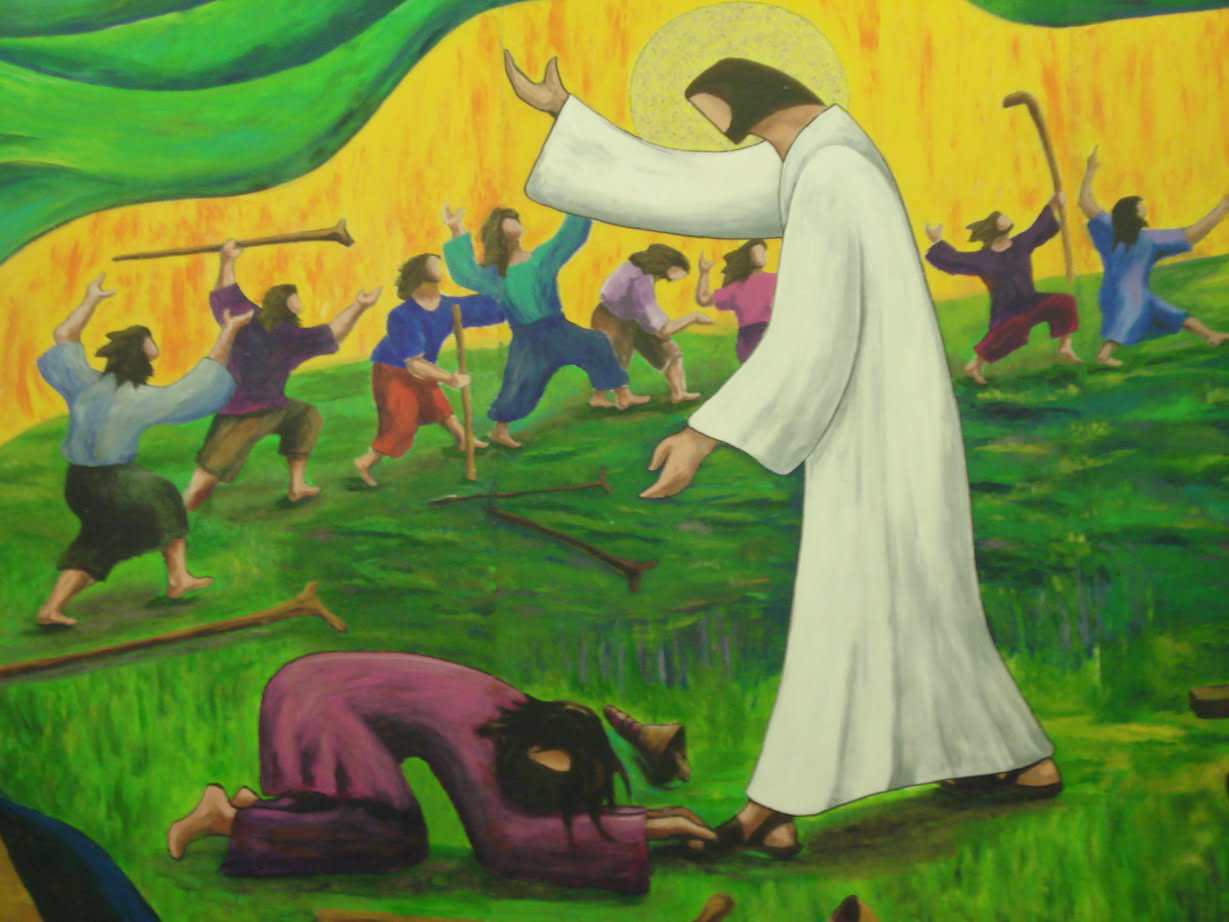 The story goes that Jesus' was taking his ministry on the road. No longer staying simply in Galilee, he makes the trek with his disciples toward Jerusalem. And on the way, he finds himself stopping at a village where ten lepers approach him.
The story goes that Jesus' was taking his ministry on the road. No longer staying simply in Galilee, he makes the trek with his disciples toward Jerusalem. And on the way, he finds himself stopping at a village where ten lepers approach him.
If we've been around scripture for very much time, we are certain to become familiar with a disease that seems to appear frequently called leprosy. Leprosy, known to us as Hansen's disease, the disease that causes grave skin malformation and open sores, but in Jesus' time, any who was labeled a "leper" as a person suffering from a range of skin issues and thus not allowed to worship or participate in cultural activities due to the regulations in the religious laws. The priests called lepers unclean.
So, for the ten lepers to approach Jesus was a very big deal. Though we often don't think of Jesus this way and at the time, his "radical" reputation was growing-- Jesus was still a Rabbi, a teacher of the law and thus for the lepers to come near Jesus at all was completely against the rules. So, what were they thinking?
I can imagine that they were thinking that they wanted to get better. And no matter how crazy this idea was to approach Jesus and ask for healing, they were willing at this point to try anything. If Jesus was a God inspired healer, as word was getting around town about him, then maybe by calling out: "Jesus, Master, have mercy on us!" might just do the trick.
And this was Jesus' response in verse 14: "He saw them, [and] said to them, 'Go and show yourselves to the priests.' And as they went, they were made clean."
And, WOW, to be labeled as "clean" meant everything to their future. Because really it wasn't the skin condition that they had which was killing them, but the isolation of being left out of everything in society. To be called clean again meant these "lepers" would be invited back into society as 'normal' human beings (and to be "normal" is what we all really want in life, isn't it?).
No longer would they be left out of invitations to family parties and religious ceremonies. No longer would they be asked to live outside of the city limits. No longer would by-passers point and stare behind their backs when they walked into a room. What Jesus gave them when he looked these lepers in the eye and said, "Go and show yourselves to the priests (the clearing committee of the time)" was giving them their life back, before their skin disease came in and took it away.
I don't know if you have ever dealt with a long period of waiting, hoping or longing for something-- such as whether it is to be married, graduate college, or hear from your doctor that you are indeed cancer free. In the midst of waiting, the process to get to the day when everything is right, everything is ok, is often excruciating isn't it? Nights of not sleeping, long days of hoping, and hours of daydreaming what it might "feel" like the day that you get the good news that you've long been waiting for.
But what happens when it such a dream day actually does come true? What does life feel like when the good news finally comes? If you are like most people in situations like this, once you reach a desired state of life, often, you not dare go back in the direction of what happened out of fear of it happening again. It's just too painful. You are ready to move forward.
With this true about our own experience, we understand the bee line for freedom that the 9 of the 10 lepers expressed that day. Even with SO much to be thankful for, it doesn't necessarily make you thankful, does it? After being healed, we never again hear about what happens to the 9.
However, in this text, there is one who forges a different trail-- a trail paved in gratitude.
"Then, one of them, when he saw that he was healed, turned back, praising God with a loud voice."
It is significant to note here that this one leper was the ONLY person in the entire gospel account that ever said thank you to Jesus. Though hard to believe, there was only one!
Of course, Jesus said "thanks" a lot. Thanking God for the blessing of food. Thanking God for God's presence with him. Thanking God for the gift of his disciples. But, never, except this one account, do we hear of Jesus being thanked by anyone.
And, if you think with me a moment about all of the healing stories and life changing moments that disciples and the surrounding crowds experienced during Jesus' time on earth, it seems outrageous that only ONE came back to say thank you.
But, while shocking to us, such a phenomenon is not outside our own realm of experience. We don't say thank you as much as we should, not because we don't feel it nor think it, but we forget too. We figure the person or persons for whom we are grateful know how much we love and appreciate them. We figure someone else has already told them, so we don't need to. We figure that those who serve us like teachers, parents, or those in position of leadership in our government do so without any need for "thanks" in return-- so why waste our energy?
But, might we be missing out on the lifestyle of gratitude that was modeled for us by the leper who came back?
In Kathryn Stockett's bestselling novel, The Help, she tells the story of a recent college graduate girl, Skeeter, living in Jackson, Mississippi who begins a writing project about the African-American women who are "the help" to the white women in their homes in 1960s. During the course of her project, Skeeter, convinces several of the town's maids to secretly meet with her and share their experiences anonymously of working for white women in a segregated society.
During one such interview Skeeter encounters a maid who worked for a woman who has recently died. The maid, though like a family member to this affluent white family, was never treated with the dignity and respect she deserved especially as she was known to work wonders with the family's colic prone children, often staying up in the wee hours of the night with them.
As the story goes, while attending the deceased woman's funeral, the maid, tells Skeeter, that she receives a note written by the woman she served right before she died. And, this is what the note to the maid said: "Thank you for making my baby stop crying. I never forgot it. Thank you."
The maid went on to tell Skeeter why it was important for her story to be recorded in the book. The maid said, "If any white lady reads my story, I hope they realize that saying thank you when you mean it and remembering what someone has done for you is so good."
In hearing the maid's story, Skeeter is surprisingly convicted about her own lack of gratitude toward her life-long maid, Constantine, whom she loved even more than her own mother, but never said thank you to either.
Though we talk a good talk about gratitude at this time of the year, when the truth boils down in your life and mine, we might just have to confess that we haven't been that one who remembered to say thank you too.
Life has gotten in the way. We've been too busy. And, before we know it, those in whom we want to say thank you to the most have passed away and our opportunity to express gratitude is gone. But, does this have to be our story?
But, if we sit for a while with the words of our text once again, we realize the exhortation placed before us today. Though it may be our natural tendency to get through difficult circumstances, rough patches in our lives and never look back, Christ's call of gratitude is to never forget the journey and though who have walked with us through life's dark days or who have stood in the gap of our lives at times when we needed them the most.
On Thursday afternoon, at the Ladies Bible Study that meets monthly currently at Eleanor Penney's home, the women gathered and I found ourselves in a conversation about gratitude. Janet Rickert shared a testimonial about a recent practice of hers-- writing notes to those in whom helped to raise and guide her becoming as a child who weren't members of her family. Taking the time as adult to write a note of gratitude for how her life had been touched by their contributions to it. When we asked her what happened next-- did she receive any response to the notes? She said yes. Those who received her cards got word back to her how happy they were to actually know of how her life had been blessed by them. What a rarity, they noted, in our world to receive words and gestures of gratitude!
And, after Janet told this story, I could help but think, what might our lives be like if such was a regular practice of our lives-- not just in cards, but in every day words and deeds? What if it didn't take a season of the year for our lives to overflow in thanksgiving for how God has watched over us, protected us and guided us through our days?
What if we slowed down our lives at such a pace that we were able to say "thank you" more often to those in whom we've had a soulful connection that has encouraged our hearts?
What if we told teachers, doctors and family members who care for us in our hours of need, thank you for their love and care? What if we looked around this room right now at the faces of our church family and said to someone how grateful we are to have them as part of our lives and as part of our worshiping community?
I believe there is something about gratitude that changes us. It connects us again to our larger human family. It takes us out of our self-centered pity parties. It opens up our hearts to make room for deeper relationships-- relationships that can truly feed our souls. Gratitude reminds us that we never journey alone.
So, might you consider practicing gratitude this morning as a way of giving feet to this sermon-- so that none of us can leaving saying that we didn't tell someone thank you today.
So, as Ken begins to play in just a moment the music of our commitment hymn, I want you to live into your thanksgivings today. So, this is what I want you to do: go to one person in this room and say thank you, to tell them that you are grateful for either their presence here today and/or their presence in your life for a particular reason. Knowing that as you do it will do your heart good as much it will do for the one who hears your thanksgivings.
Then, we will gather together again and sing the hymn "Count Your Many Blessings" as a way to thank the One for whom we ultimately all our lives to anyway, Jesus Christ who is our Lord.
Let us practice thanksgiving today.
AMEN